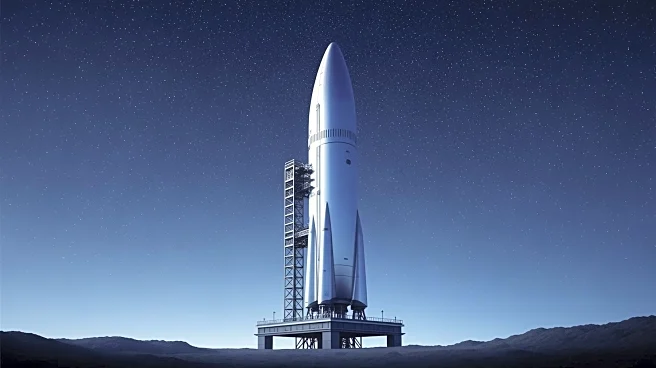What's Happening?
SpaceX's Starship rocket recently completed its second successful test flight, marking a significant step towards its goal of carrying NASA astronauts back to the moon. This development comes amid a heated
space race between the United States and China, with NASA selecting SpaceX for a mission scheduled for 2027, which aims to be humanity's first return to the lunar surface in over 50 years. However, SpaceX faces challenges, as it is behind schedule due to previous test failures, including explosions that scattered debris over the Caribbean. The company plans to roll out an upgraded Starship prototype by early next year, which will be crucial for conducting orbital flights and testing key procedures necessary for future crewed missions.
Why It's Important?
The reliance on SpaceX for NASA's lunar mission underscores a significant shift in the U.S. space program, where a private company holds the key to achieving national space exploration goals. This situation highlights the growing role of commercial entities in space exploration, which traditionally was dominated by government agencies. The success of SpaceX's Starship is critical not only for NASA's mission but also for maintaining U.S. leadership in space exploration, especially as China aims to land astronauts on the moon by 2030. The outcome of this race could influence geopolitical dynamics and technological advancements in space exploration.
What's Next?
SpaceX plans to introduce an upgraded Starship prototype early next year, which will be essential for conducting orbital flights and testing procedures like fuel transfer and payload delivery. These tests are necessary before any crewed missions can occur. The pressure is on SpaceX to meet these milestones to ensure NASA's lunar mission proceeds as planned. The broader implications include potential shifts in space policy and increased scrutiny on the capabilities and reliability of private companies in fulfilling national space objectives.
Beyond the Headlines
The reliance on SpaceX for NASA's lunar mission raises questions about the privatization of space exploration and the ethical considerations of entrusting national priorities to private entities. This development could lead to discussions on the balance between government oversight and commercial innovation in space exploration, as well as the long-term implications for international space cooperation and competition.









